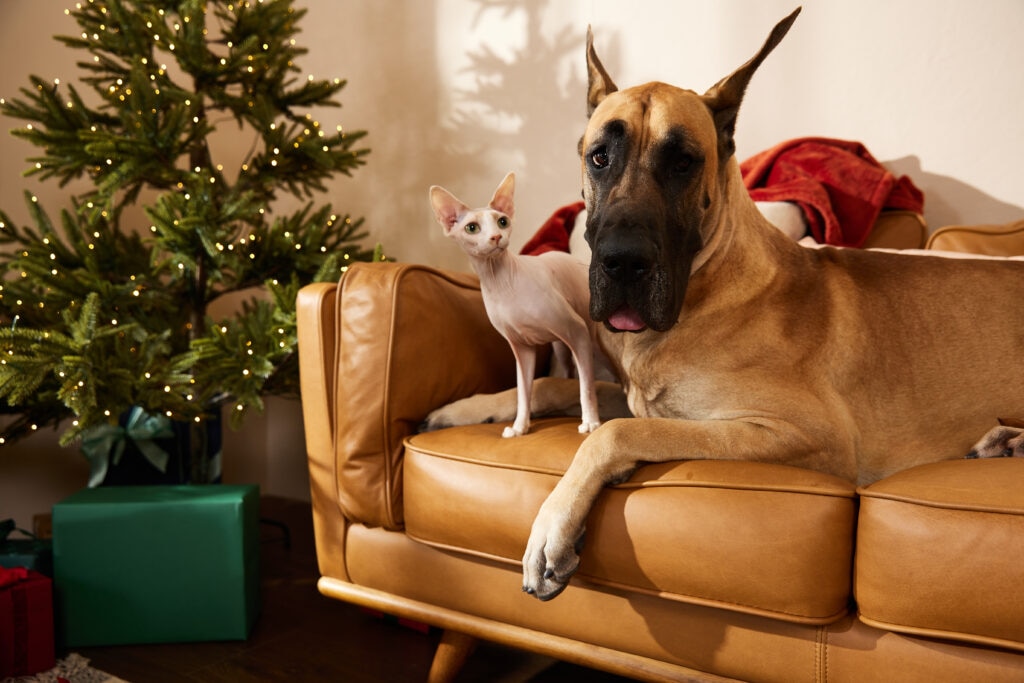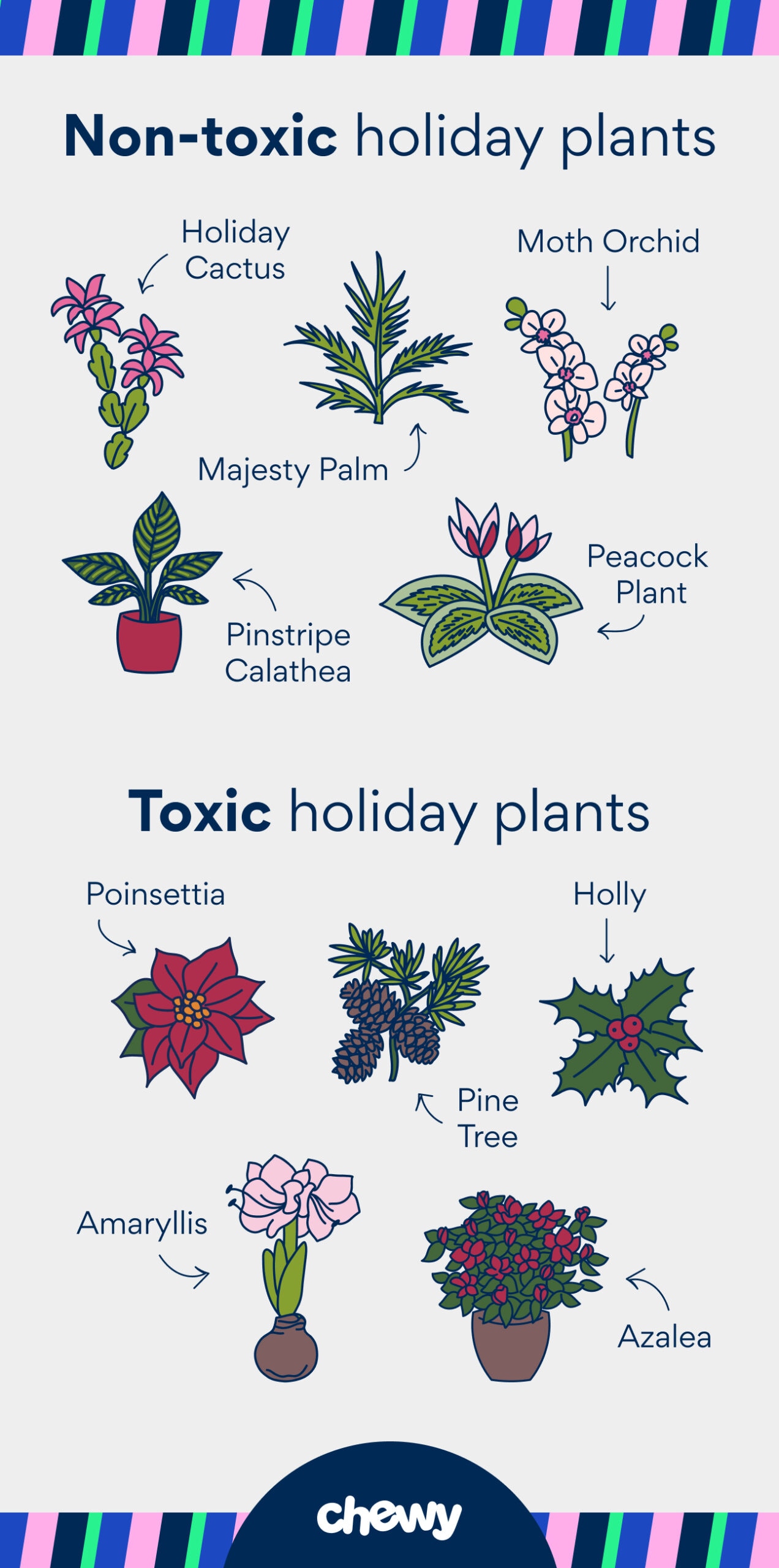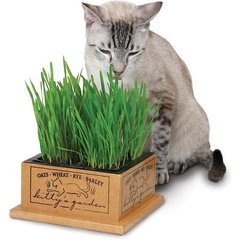8 Pet-Safe Holiday Plants—and 10 Common Ones To Avoid

Photo by Chewy
The holidays are made merrier with some festive greenery around your home, but it’s important to decorate with plants that are pet-safe.
New plants in the house will attract curious cats and dogs who may gather to sniff at and—in some cases—nibble on them. So, make sure the plants you pick are OK for your four-legged friends.
Here’s a list of pet-safe options—and some popular holiday plants to avoid.
Did your pet eat a toxic plant? Immediately contact your veterinarian or Pet Poison Helpline at 855-764-7661.
Key Takeaways
- Some favorite holiday plants are safe for pets, including the Christmas cactus and Norfolk pine.
- Other holiday plants may be mildly toxic to pets (like the poinsettia) or even life-threatening (like yew, found in wreaths).
- Keep your pets away from all plants, even if they’re safe. Invest in a dog gate for your pup and distract cats with yummy cat grass.
- Mistletoe is one of the most dangerous plants for pets; if your dog or cat ingests any, head to an emergency vet immediately.
8 Pet-Safe Holiday Plants
For some festive holiday plants, stick to these pet-safe options:
- Christmas cactus: This plant gets its name because it blooms at Christmastime, and it’s nontoxic for both cats and dogs.
- Rosemary: An aromatic herb that’s pretty and yummy in all sorts of dishes, rosemary is safe for both dogs and cats.
- Moth orchids: Many orchid varieties bloom during the holiday season, and they make wonderful gifts. They’re nontoxic to both dogs and cats.
- Boston fern: This soft and leafy plant pairs beautifully with holiday decor, and it’s approved for felines and canines alike.
- Camellia: A beautiful winter-blooming flower that comes in shades of red, white, and pink. You’ll often find it in holiday arrangements, and it’s nontoxic for pets.
- Winter jasmine: This wonderfully fragrant plant is approved for cats and dogs and adds a nice burst of holiday cheer.
- African violet: These year-round bloomers come in rich shades of crimson, purple, white, blue, and pink. Pets get the all-clear here.
- Norfolk pine: Often used as “little Christmas trees,” this beautiful and soft pine is OK for your furry friends too.
Even if your holiday plant is pet-safe, you still don’t want to deal with your pup nibbling on or knocking over that pretty arrangement.
For dogs, keep the plant up high—or use a pet gate to limit access.
Recommended Products
For cats, offer a desirable alternative, such as cat grass, to steer them away from your holiday plants.
Recommended Product
10 Common Holiday Plants To Avoid
These common holiday plants are off–limits to pets. Note that mistletoe and yew—particularly common this season—are among the most dangerous.
| Plant | Toxic to Cats or Dogs? | Toxicity | What To Do |
|---|---|---|---|
| Amaryllis | Both | Moderate to severe | Emergency vet immediately |
| Azaleas | Both | Moderate to severe | Emergency vet immediately |
| Boxwood | Both | Moderate | Call vet or hotline and monitor closely |
| Christmas Rose (Hellebore) | Both | Moderate | Call vet or hotline and monitor closely |
| English Ivy | Both | Moderate | Call vet or hotline and monitor closely |
| Holly | Both | Moderate | Call vet or hotline and monitor closely |
| Mistletoe | Both | Moderate to severe | Emergency vet immediately |
| Paperwhite | Both | Severe | Emergency vet immediately |
| Poinsettia | Both | Mild | Call vet or hotline and monitor closely |
| Yew | Both | Life-threatening | Emergency vet immediately |

Photo by Chewy
My Pet Ate a Toxic Plant—What Do I Do?
If you suspect that your cat or dog has eaten or chewed on a toxic plant, call your veterinarian and/or Pet Poison Helpline right away at 855-764-7661.
If the plant is mildly toxic, you can wait for guidance from these sources before taking any next steps.
However, if the plant is considered moderately to severely toxic—or if your pet is showing signs of poisoning, including vomiting, diarrhea, drooling, lethargy, difficulty breathing, swelling, or irritation—head to an emergency vet right away. (You can call the Pet Poison Helpline on the way for extra guidance.)
Poisoning treatment depends on the plant and how much was eaten, but the vet may induce vomiting, administer activated charcoal to absorb toxins, or provide IV fluids and medications to protect vital organs. They may also monitor your pet if ongoing supportive care is needed.
It’s critical to act quickly, so seek professional help immediately to give your pet the best chance at a swift recovery.
FAQs About Pets and Holiday Plants
Are poinsettias poisonous to cats?
Yes, poinsettias are mildly toxic to cats. They contain a milky sap that can cause skin irritation and digestive upset, and in some severe cases vomiting. If you notice signs of poisoning in your pet, immediately call your veterinarian or the Pet Poison Helpline at 855-764-7661.
Are poinsettias poisonous to dogs?
Poinsettias are mildly toxic to dogs and can cause skin irritation, GI issues, and sometimes vomiting. Call your veterinarian or the Pet Poison Helpline if your dog ingests this plant.
Are Christmas trees poisonous to cats and dogs?
Fresh Christmas trees aren’t toxic to pets, but the sharp pine needles (if eaten) can cause irritation. Water in the tree stand is another concern because it often contains bacteria or chemical preservatives that can make pets sick.
To keep your furry friends safe, block access to the tree water and clean up fallen needles.






